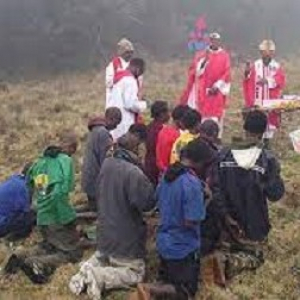Peter MALONE
Escape Room: Tournament of Champions
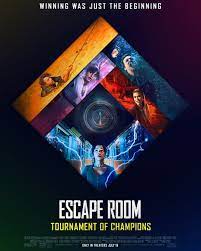
ESCAPE ROOM: TOURNAMENT OF CHAMPIONS
US, 2021, 88 minutes, Colour.
Taylor Russell, Logan Miller, Thomas Coerquel, Indya Moore, Holland Rodan.
Directed by Adam Robitel.
Escape Room seems a modest enough title for a horror film. But: Tournament of Champions seems a bit much for this sequel.
In 2019, Escape Room was a box office success, especially with younger audiences who could identify, in age, with the central characters. The studios were very pleased with the success and the sequel was, more than perhaps, inevitable. And, in fact, it is something of a rerun of the original. Once again, there is the threatening anonymous company which makes these lethal puzzles and games. Once again, the survivors from the first film, Zoe and Ben (Taylor Russell and Logan Miller) become involved in the new set of rooms to be escape from. But, Zoe, mourning the death of Amanda in the first film, is intent this time to defeat the company, Minos.
Just in case the action of the first film was not in the forefront of our memories, this sequel opens with a slick trailer-like collage to remind us. Zoe is also seeing a psychiatrist who warns her that anything she observes can become a clue to her puzzle – but this still does not solve her problem, her fear of flying. So, she persuades Ben to drive to New York for the confrontation, the Tournament.
One has to say that the pacing of these films is sometimes breathtaking, fast, dramatic, jolting. This is especially the case when the trapped characters are desperately trying to work out where the clues are, what the clues are, what the clues mean, going to action in time before they are trapped, the eagerness to get to the next room where the potential entrapment opens all over again.
Zoe and Ben are tricked into chasing a purse-snatcher into the New York subway, knocking people out of the way, then trapped in a carriage. It becomes ominous. The random collection of characters in the carriage inevitably turn out to be past survivors of Minos games.
We don’t learn particularly much about the others, especially as it is a variation of “And then there were none…”. However, one of the older ones is of more interest, Nate (Thomas Coquerel) who turns out to be a priest who had participated in the game where, with fellow priests, their faith had been tested in their attempts to escape entrapment. He feels guilty as the sole survivor. And he will have the opportunity to atone for his behaviour, literally reaching out to save another.
What makes the film interesting is that there are four set pieces, escape rooms, to test ingenuity. There is the train carriage. There is a rather sophisticated room full of deadly traps, keys and locks. There is an artificial sequence by the sea, the background painted, a lighthouse, a shop, but the seashore quicksand. And, finally, a New York setting with acid rain.
There is a twist, actually several twists at the end, Amanda reappearing and explaining what has happened, Zoe being tested about her aims of confronting the company and the possibility of saving Ben.
And, of course, and ending with Zoe actually on a plane, but…
While geared for the younger demographic, older audiences, like this reviewer, will quite enjoy the Escape Room films, even if sometimes rather out of breath,
- The popularity of the first film? The surviving characters? Sequel? The same pattern? Survivors and the challenge to survive or crush the company?
- The concept of the escape room, the characters trapped, alert to the clues, testing the clues, escaping to the next test, some not surviving?
- The recapitulation of the first film, setting the tone, Ben and his desperate nightmare contributing to the tone?
- The focus on Zoe and Ben? In the first film? Surviving the escape room? The effect on Zoe, her fears, going to the counsellor, seeing everything as a clue, her fear of flight? Her determination to confront Minos? Driving with Ben? New York, the site for the company, abandoned, the person nature, the chase, his leading them to the underground, the carriage?
- The ordinariness of the carriage, the desperation of the pursuit through the city, knocking people aside, into the carriage, the other characters?
- The feeling of threat, the uncoupling of the cars, the alternate line, the crash? Trapped, the electricity? The man with his iPad, wanting to get home to his wife? Electrocuted, the first death?
- The pace of the first test, the editing, frantic, the clues with the missing letters, tokens, the threats? Getting out? Then the elevated descending? The formal room? The first death
- The characters, little background, Rachel and her being a survivor, Breanna? Nate, his story about being a priest, the testing of the five priests and seeing whether their faith could help them survive? His survival, alone, sense of guilt, drinking, in the carriage? His participation in the solutions?
- The frantic pace in the room, finding the clues, the various keys, the various locks, the laser beams and lacerations, Nathan and his testing out the steps, the explosion, his collapse, Ben carrying him? The map of the steps, Zoe going through at the last minute?
- The beach situation, reality, the painted backdrop, the manikins and the shell in the eye, the lighthouse, the stores? The quicksand? Rachel being drawn in, the anchor with the rope, Nathan going into rescue her, his self-sacrificing death? The alternate escapes, at the top of the tower with Zoe, the tunnel in the store? Ben, climbing the ladder, falling into the quicksand?
- The underground, hearing the New York sounds, the manhole, the getting out, discovering the New York situation, the acid rain and the umbrella, the awning, Rachel’s reappearance, Breanna? The phone calls, the taxi, lacerations and death?
- Zoe surviving, encountering Amanda, the memories of the past test, Amanda prisoner, the story of her daughter, the twist with Amanda falling but not dying, forced by the company to invent the games? The same pressure on Zoe, that she designed games, Ben in the outer tank, the water, rising, Zoe refusing, Amanda helping her? Setting the building on fire, rescuing Ben?
- The police, the statements, everything seeming normal? The interviewer? Zoe, confident in the plane, in the aisle, seeing the therapist or not? The brilliant to a sequel?
- Audiences enjoying identifying with the characters and the desperate situations?
Hot Air
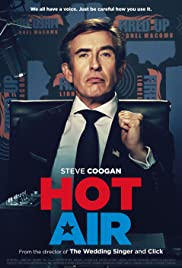
HOT AIR
US, 2018, 99 minutes, Colour.
Steve Coogan, Taylor Russell, Neve Campbell, Griffin Newman, Pico Alexander, Tina Benko, Judith Light, Skylar Astin, John Rothman.
Directed by Frank Coraci.
Here is an opportunity for Steve Coogan (a versatile actor but very well known for his television comic personality, Alan Partridge) to perform as a television shock jock. (Echoes of Fox news and more extreme commentators.) He has ample opportunity to show shock jock rudeness, interrupting those with whom he disagrees, including a Senator with liberal tendencies (Judith Light), and not a very nice personality off air.
His screen persona as well as his real self is challenged by the arrival of his bi-racial niece, played by Taylor Russell, so effective in Words on a Bathroom Wall. She is in reaction against her addict-mother, trying to bargain with her mother to come off the drugs for her to go to college. Her uncle takes her in but life becomes very complicated, with his friendly girlfriend (Neve Campbell), and her getting an apprenticeship at the television station.
There are quite some subplots concerning machinations at the television station, various assistants, double dealings, revelations of the truth about the uncle’s life – and the audience leaning learning that a lot of his problems come from family disputes, clashes with his mother and sister.
Ultimately, there is some feelgood resolution for the film, not going to far on the denunciation of shock jocks, but giving them some kind of redemption. The film is directed by Frank Coraci who directed the number of Adam Sandler films.
- The title? Radio story? Radio talk, talk back? Political perspectives? The title and ordinary conversations, family interactions?
- New York City, during the Trump presidency? The studio? The home, interiors? The television studio and audience? The streets of New York? The musical score?
- The film as a star vehicle for Steve Coogan, his British comic background, serious roles, portraying an American? The director and his work for Adam Sandler? The film as a star vehicle for Taylor Russell, the beginning of her career?
- Lionel’s story, seeing and hearing him in action on the radio, his political stances, Conservative, critical of liberals? The content of his talks, the criticism of the member of Congress, the issue of migrants, rights? His invective tone? The criticisms of his audience? Yet his fans? The American phenomenon of right-wing radio personalities? The shock-jock style?
- Lionel’s personal story, coming from nothing, his mother and her behaviour and relationships, not mothering her children, Laura, age 17, the boyfriends, taking Lionel’s money, his waiting for her, her disappearance? His staying at home for two more years, abused by his mother’s boyfriends? His getting out?
- Lionel as the self-made man? Living alone, his reliance on Val? Sexual affairs, the housekeeper? An angry man?
- Tess’s story, her age, coming to New York, the tactics of getting in to see Lionel, Tyler losing his job, getting it back? Her revelation to Lionel? Her self-assertion, her devotion to her mother, her mother in rehab, the promise to go to college? Lionel accepting her, reluctantly, the room, meals, meeting with Val and communicating with her, coming to the studio, her comments on Lionel’s behaviour? The photos and the memories? In the studio, Lionel putting her on air? Going to the television show?
- Her friendship with Grayson, telling him the story, his using the material on the show? Her being upset? Lionel upset with her?
- Val, her relationship with Lionel, assistant, professional? The friendship with Tess, the visit of the Gallery, buying the photo, giving it to her at the end? Her confronting Lionel, unable to work with him?
- Laura, leaving rehab, Lionel reluctant to tell Tess, eventually telling her? Her reaction? Leaving? Laura turning up, the meeting between brother and sister, the tensions? Accommodation? Tess and her mother, going to the park? Packing, in the car, the painting from the visit to the Gallery with Val, mother and daughter leaving, having to have a talk? The prospects? Seeing her mother taking her daughter to college?
- Lionel, his producers and the work in the studio, the placards against him, getting the protester to go on the radio? The rival, smarmy manner, the discussions about going on the show, his presence, sardonic, the arrival of the Congresswoman, her cause and speech, the host and his telling the story of Lionel is growing up? Lionel deflecting it?
- The impact of Lionel’s speech to the audience, the denunciation of complacent America? Forceful?
- Lionel, allowed to go back on air, the drawer with the photos, talking to Tess, her fighting photos, the phone call back?
Dear Evan Hansen
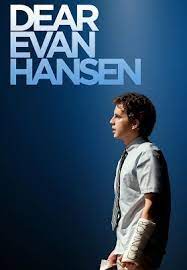
DEAR EVAN HANSEN
US, 2021, 137 minutes, Colour.
Ben Platt, Julianne Moore, Kaitlyn Dever, Amy Adams, Danny Pino, Amandla Stenberg, Colton Ryan, Nik Dodani.
Directed by Stephen Chbosky.
Before production logos and film titles come up, there is a cautionary warning that this film deals with mental issues and suicide. These themes pervade the film as well as themes of grief.
Dear Evan Hansen is based on a Tony and Grammy award-winning Broadway production, the book written by Stephen Levinson who adapts for the screen. There is quite a range of songs throughout, lyrics and music by Justin Paul and Benji Pasek.
Not every audience likes musicals. This is very much a 21st-century musical, not like the musicals of Hollywood’s heyday. Rather, this is a dramatic story where the music and songs are part of the character development. This reviewer was a bit wary at the opening, especially when Ben Platt’s Evan Hansen begins to sing, voicing his stream of consciousness. However, Platt, who won a Tony for his Broadway performance, and despite the fact that he is in his mid-20s playing the role, seems convincing, winning over an audience.
The title comes from an exercise suggested to Evan Hansen by his therapist, to write letters to himself, expressing his feelings, his hopes for a day. This he does but has some encounters with an angry, dominating fellow-student, Connor (Colton Ryan) who signs Evans arm cast, after a fall from a tree, later attacks Evan, snatching away the printout of his letter.
The screenplay leads in an un-anticipated direction, Evan’s letter found afterConnor kills himself, the assumption being that this was Connor’s suicide note. What should Evan do? Tell his grieving family the truth? That he was not a friend of Connor at all, barely knew him? Though Evan was attracted from afar by Connor’s, sister, Zoe (Kaitlyn Dever) and there are references to her in the letter.
Evan, prone to depression, lacking self-confidence, empathising with the grieving parents (Amy Adams and Dan Pino) not only starts to make admissions about his friendship, but starts to fantasise, creating stories, getting his school friend, Jared (Nik Dodani, scepticism personified) to create fictitious emails from Connor to Evan.
As a consequence, despite Evan, many good things happen. An activist fellow student, Alana (Amandla Stenberg) organises a memorial, starts at home environmental movement to reinvigorate a orchard that Connor liked, Connor’s parents becoming more and more involved, Zoe becoming more and more puzzled, attracted to Evan.
On the way so much of this is communicated by the songs, not tunes, but melodies not easily memorised, more recitative style, all the characters having their turn to sing (even to some dancing), pleasing to listen to, enabling the characters, especially Evan, to express himself more convincingly, and for audiences to appreciate the inner sentiments of the characters. This is especially true in a climactic moment at the Memorial, the nervous Evan beginning to sing – and, this being an instant social media world, his being filmed, seen, followed, ever-increasing followers.
And, all the time, we wonder how Evan will emerge from this deception, with the truth will be told, and what the consequences will be for everyone. It is a strength of the screenplay that all these aspects are fully confronted, the truth emerging. And, in this, Evan is supported by his hard-working mother, Julianne Moore, misunderstandings, exasperation is, truth and reconciliation.
While so many aspects of this story deal with depression, are disturbing for the audience, the writers of the story are not without hope, even to finding some good in Connor whom everybody, except for his doting mother, could see no good in.
So, not every audience will be drawn in by this kind of musical, but for those who do, some surprises and values.
- Adaptation of the Broadway musical, Tony awards, Grammys? The transition to the screen?
- The home setting, the school setting?
- The musical score, the songs, the recitative lyrics, the melodies? Insertion into the action, revelation of inner thoughts and feelings, revelation of characters?
- Evan Hansen himself, Ben Platt’s performance, age, singing? His situation, living with his mother, mental issues, depression, the psychiatrist, the suggestion of writing letters to himself? The first letter, contents, self-confidence? At school, the reaction of the students,Connor and his attack, writing his name on the cast, at the printer, taking the letter, the consequences?
- Evan, his friendship with Jared, Jared as a sounding board, the touch of the cynical, gay sensibility? Evan and his fears of Connor distributing the letter? His relationship with his mother, her work, absences, her loving support, but feeling it?
- The news of Connor’s suicide, the effect on Evan? The letter being found, Connor’s parents coming to see Evan, the mother, her hopes, to know more about her son? The audience having seen, and not liking him? The parents attempt at rehabilitation? Zoe and her dislike of her brother?
- Evan, confronted with the letter, his emotions, not telling the truth, the consequences? His having to pretend? With Jared and the fabrication of the text messages? The response of the parents? Zoe questioning? Evan, invited into the family, the meals, the conversations, the memories? Connor’s background, the stepfather, his mother?
- Alana, the students, her enthusiasms, causes, checking with Evan, setting up the foundation, the orchard and the reconstruction, environment? Alana as a personality, her being driven? Relying on Evan? The decision to have the memorial service? The aftermath and disappointment?
- Evan and the story about the orchard, walking with Connor, his favourite place? The work for the foundation, the money target, advertisements, campaigning, the money coming in?
- The day of the service, Evan expected to speak, his unwillingness? His talk, the transition, the singing? The effect on everyone? The cameras, social media, the followers? The reaction of the students?
- Evan’s mother, her surprise about his links with the family, the visit, the discussions, taking home? Her being upset? The offer of financing his college fees? Is mother’s refusal?
- Social media, turning against Conor’s family, being rich, whims, their treatment of their son?
- Zoe, Evan’s attraction, watching her with the music, her change of heart, talking with Evan, but then turning against him?
- The unexpected response to Evan, the video of, playing the guitar and singing? Some consolation for the parents? The stepfather’s tears?
- The moral dilemma, whether to tell the truth or not? His decision, his explanations, the reaction of the parents, Zoe? The effect on Evan, the discussions with his mother, the truth about climbing the tree and the cast, that he was contemplating suicide and failed? His mother’s response?
- The freedom of the truth, his walk in the orchard, Zoe coming to talk with him, his graduation? His future?
Encanto
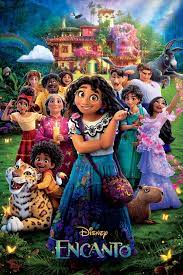
ENCANTO
US, 2021, 12 minutes, Colour.
Stephanie Beatriz, Maria Cecilia Botero, John Leguizamo, Jessica Darrow, Diane Guerrero, Wilmer Valderrama, Alan Tudyk.
Directed by Jared Bush, Byron Howard.
A Disney animation set in Colombia, strong on Hispanic atmosphere, many of the voice cast with Hispanic backgrounds.
Once again, the central character is a young girl, but not really a Princess this time. In fact, something of the opposite. She is Mirabel (voiced by Stephanie Beatriz), a member of the prominent Madrigal family, presided over by the grandmother, the Abuela, with each of her children and grandchildren having special magical gifts. Except Mirabel. She was about to receive her gift but the vision faded. And, here she is, doing a lot of the menial tasks, clashing with her perfect sister, Isabella, and she wears glasses!
There is some edge in the story. At the opening, the Abuela tells the story of how she and her husband fled their home, pursued by men on horseback. Her husband sacrifices himself and she and her children find refuge, along with a magic candle, which enchcants the place where they find refuge, mountains, woods, and are welcomed by the townspeople. And their mansion, as well as the place, are enchanted, Encanto.
Hispanic. Music and songs. Lin-Manuel Miranda again. With In the Heights, with tick… Tick… Boom!, he has had a busy year – and now he contributes the songs, not so many of them, throughout the film as well as taking on one of the voice roles.
We spend a lot of the film getting to know the various characters in the family – and we probably like the big girl in the family whose special gift is that she is able to carry heavy loads. Needless to say she is, literally, put upon at times. This contrasts with the perfect daughter who is to be betrothed to a young man – and she does not want to be engaged to. Mirabel seems always to get in the mix and causes huge upset at the betrothal dinner, the prospective family walking out.
But the intriguing character is called Bruno. We see his image on a magic door – and there is a song that everybody sings that they don’t want to talk about Bruno-no-no-no! When we eventually meet him, we discover that he is in hiding in the corridors and attics the mansion, more than something of a nerd (voiced by John Leguizamo), who is supposed to see visions of what is to happen to the family.
Of course, it all builds up to quite some adventures, especially with Bruno and Mirabel and some dangers on roofs and falling. But, the solution is to be love and reconciliation, between Mirabel and Isabella (and a nice song with dancing for that to be achieved) but also for Abuela to think back to her past (which we see again), questioning her treatment of Mirabel, and a theme of forgiveness. And, fortunately, this being a magical entertainment, love, reconciliation, and the wonderful rebuilding of the mansion means that we all sing along to a happy ending.
- Popular ingredients of a Disney animation story? The Latin American setting? Colombia?
- The American audience, the Latin American presence in the United States?
- The style of animation, colourful backgrounds, the characters, idiosyncrasies, the Encanto, the mansion, the interiors, the corridors and attics, the town itself, shops, festivities?
- The musical score, the songs, the lyrics, revealing characters, situations?
- The background story, Abuela and her memories, with her husband, the three babies, having to flee, the pursuing horsemen? Her husband giving himself up? The river, the enchanted candle, the changing of the countryside, the mountains, protection? Settling in the village? In the retelling of the story at the end?
- Abuela and her control of the household, the musical name, Madrigal? The different generations, Mirabel and her two sisters? The comedy of the Big Sister and her capacity for carrying loads? The contrast with Isabella, considered perfect, her songs and dancing, the prospective marriage, the meal, Mirabel interrupting, the intended family walking out?
- Mirabel, awkward, doing the menial jobs, wearing glasses? Not quite the Disney princess? The rest of the family having their own talent, her standing before Bruno’s vision, its fading, her not having a talent? Having to cope, disappointed?
- Bruno, his reputation, his visions, the magic doors and the visions, his going back behind the doors, living in the corridors, nerdish look, behaviour? Mirabel finding him, his inabilities, her pursuit, the dangers and adventures, falling, saved? The family singing the song about Bruno?
- The rest of the family, the men, the different generations? Antonio, the ceremony, his age, his receiving his gift, all the animals?
- The mirror, with the story, shattering in pieces, Mirabel collecting them, the magic effect, disasters?
- Disaster for the town, the building collapsing, the family upset, blaming Mirabel?
- Mirabel, dismay, being blamed by Abuela, going to the river, the reliving of the past, change of heart, admiration for Mirabel? The reconciliation?
- Love, the magical rebuilding of the mansion, the townspeople all joining in? Happy ending?
Hand of God, The/ E Stato la Mano di Dio
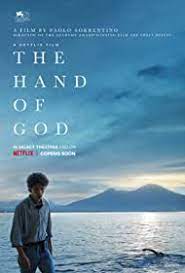
THE HAND OF GOD/ E STATO LA MANO DI DIO
Italy, 2021, 130 minutes, Colour.
Filippo Scotti, Toni Servillo, Teresa Saponangelo, Marlon Joubert, Luisa Ranieri, Renato Carpentieri, Betty Pedrazzi,Ciro Capano.
Directed by Paolo Sorrentino.
By this stage of his career, Italian writer and director, Paolo Sorrentino, has achieved high status in Italian cinema and in world cinema (many awards including an Oscar for The Great Beauty/ La Grande Bellezza). He has made distinctive films but he has also made an international impact with his television series, The Young Pope and The New Pope.
Many have asked who is Paolo Sorrentino, what is his background? Sorrentino has decided to answer these questions himself and made an autobiographical film. The main events in this film correspond to Sorrentino’s early life.
We are in Naples where Sorrentino hails from. It is the mid-1980s and his character, here called Fabie, Fabietto, is in his final year at school. He shares a room at home with his brother, Marchino. They are played by Filippo Scotti and Marlon Joubert. Marchino has ambitions to be an actor but he does enjoy the easy life. Fabie, on the other hand, is rather scrawny, sometimes a bookworm, and, it would seem, wanting to be a bit like the rest of the boys. And, at his age (and the reputation of Italian libido) he has something of a quietly roving eye.
The tone is set with the opening sequence involving Fabie’s Aunt Patrizia, an episode where she is visited, allegedly, by the Neapolitan St Gennaro, and taken to see The Little Monk (rather a little Franciscan child Friar) who promises her that she will be able to conceive a child. But, at home, her husband berates her for being a prostitute, not believing her – and her sister, Maria (Teresa Saponangelo) with her husband, Saverio (Toni Seervillo) hurry to her on the back of Fabie’s motorbike.
This touch of magic realism is then offset by a long realistic sequence where the extended family go out on the boat, have a picnic, wander through the woods – Fabie having his eye on his apartment as she basks in the sun.
There is some discord in the family, Saverio and his mistress, Maria and her propensity for playing pranks (even pretending to be Franco Zeffirelli’s agent ringing her neighbour to offer her a central role in his next film), Marchino and his failing at a screen audition, Fabie going to see some plays, enraptured in theatre, encountering the Neapolitan film director, Antonio Capuano, who, later in the film, will challenge Fabie in his beliefs in himself, in his desire to be a filmmaker.
And all of the action in the context of Maradona being signed to Napoli, matches, fans and enthusiasm, goals!
In the same house as the family is the Baroness, a haughty woman, who will later have a significant impact on Fabie and his sexuality.
The sad part of the film, and this relates to Sorrentino’s parents in real life, is their moving to a country house, a fireplace, there being overcome by carbon monoxide and dying.
As with Sorrentino’s other work, there are all kinds of snippets of scenes, relevant and irrelevant, but creating atmosphere – and more than a nod to Federico Fellini, his name being mentioned, and a scene of auditions for one of his films with a gallery of grotesques the Fellini himself might be envious of.
So, this is Paolo Sorrentino, the younger.
- The cinema achievement of Paolo Sorrentino? Audience interest in him? His background? His storytelling, cinema style?
- This film as a memoir, based on facts, remembered and imagined? The young Sorrentino? Some explanations of his life and career?
- The setting, Naples, the 1980s? The Maradona background, Maradona in Argentina, the plan for him to come to Naples, the joy at the achievement, his playing, training, the scenes of the matches, the family in crowd support?
- The opening, Patrizia, at the bus stop, the magical realism of San Gennaro, the meeting with The Little Monk, the promise that she would become pregnant? Her return home, the denunciation by her husband? The indication of her mental condition, problems? Sexuality?
- The family hurrying to help her, on the back of Fabie’s motorbike? The introduction to the family, Saverio, age, experience, work (and the later revelation about his mistress and her child)? Maria, their meeting during the war, the happy life, their two sons? Maria, her sense of humour, the pranks, phoning the neighbour and pretending to be Zeffirelli’s agent and offering her the central role, the angry consequences? The parents and their relationship with their children?
- The transition after the magic realism opening, the long sequence of the boat ride (and Patrizia sunbaking and Fabie watching), the trek, the picnic? Creating the atmosphere for the Neapolitan family?
- The focus on Fabie, the young Sorrentino, his age, sharing the room with his brother, his brother as a young man about town, wanting to act, the audition, failing? Yet his support of his younger brother? Fabie, slight, studious? Yet the Italian roving eye?
- Life in Naples, family, indication of time with watching Once Upon a Time in America? Indication of films, the audition, references to Fellini, the audition with the room full of grotesques? Sorrentino and his being influenced by Fellini? Sergio Leone? The introduction of Antonio Capuano, direction, the auditions, going to the theatre, his public denunciation of the actress, meeting with Fabie, the discussions about truth, storytelling, the making of films?
- Difficulties with his parents, the clash because of the mistress, Maria for giving her husband, allowing him back? The prospect of the new house? The happiness, the fireplace – and the sudden news of the carbon monoxide deaths? The sons going to the hospital? And Fabie being distraught?
- Fabie, sexuality, the Italian tradition of sexual initiation? The role of the Baroness in the house, her haughty manner, her encounter with Fabie, the sexual encounter and the consequences? And initiation and her urging him on to his full of life? His visit to Patrizia in the hospital and the bond with her?
- An excursion back into life in Naples? Throwing light on Paolo Sorrentino’s life and career?
Card Counter, The
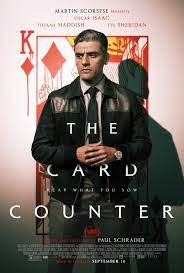
THE CARD COUNTER
US, 2021, 111 minutes, Colour.
Oscar Isaac, Tiffany Haddish, Tye Sheridan, Willem Dafoe, Alexander Barbara.
Directed by Paul Schrader.
The film written and directed by veteran Paul Schrader, a film about cards, blackjack – but, eventually, much more.
To offer a flavour of what will be seen is a suggestion that there is going to be a flurry of articles (even theses?) forthcoming, exploring the similarities between Schrader’s characters, Travis Bickle, the Taxi Driver, and William Tillich, the Card Counter – personalities, events shaping their characters, obsessions, motivations. And, while Travis Bickle looked into his mirror and asked “are you talking to me?”, William Tillich frequently gazes into mirrors but asking himself who he really is.
Oscar Isaac is William Tillich. Oscar Isaac has built up a substantial career over 15 years, appearing in 2021 in the television series remake of Ingmar Bergman’s Scenes of a Marriage as well as playing Duke Leto in Dune. Isaac has a serious demeanour, often quite some gravitas – and this is how he initially appears as the Card Counter.
He has quite a back story but we do not learn this for quite some time. Rather, we learn that he has spent some time in prison, found that regular prison life appealed to him more than his previous somewhat reckless life. He had played cards, learn to count cards, and offers quite an explanation of his methods of counting – which may be illuminating to poker players but is rather overwhelming for audiences who are trying to keep pace (and never could while participating in poker) with his explanations and methods.
He encounters three characters. Tiffany Haddish (not in a comic role this time) is a gambler who has created a stable of her players and found them wealthy backers, moving them from card tournament to tournament around the US. Willem Dafoe is seen as giving a lecture on security technology and identity recognition. Tye Sheridan is a young man, sitting next to William at the lecture who unburdened himself about his past – creating a link between his father and telling.
And, the audience has been prepared for some revelations by a dream sequence which William has in his hotel room (where he always covers mirrors and all furniture with protective sheets, tying them with rope). The nightmare is of torture tunnels at Abu Ghraib, so visually churning sequences of the torture that took place there, visual, brutal, humiliating, relentless).
Which means that this interesting film takes us in quite a different direction, the revelation about William’s past, the reason that he was in prison, the connection with Willem Dafoe and his masterminding and supervising so much of the torture, and the young man’s father also involved.
Schrader raises the possibilities for William Tillich – to join with the young man and follow a path of revenge or to become a mentor to the young man, urging him to make contact with his alienated mother, willing to provide finance for him and his studies, all with the approval of La Linda. In the meantime, William continues with his tournaments, battling a braggard who appears at every tournament, with his ragtag and loud supporters, Mr USA.
Has William made peace with his past life, found love and companionship with La Linda, enabling the young man to find some meaning and hope in his life? With a Paul Schrader film, this kind of happy ending seems rather unlikely – but we need to see it to the very end to appreciate the moral decisions of William Tillich.
- Paul Schrader’s career, writing and directing, serious and sombre themes? His perceptions of American life?
- The world of casinos, interiors, their looking alike, the poker machines, the games and the tables, the card counters, the croupiers? The world of hotels and motel rooms? The contrast with the prison sequences?
- William’s nightmare, the elaborate presentation of the tunnels and torture at Abu Ghraib?
- William’s story, a card counter, the audience not knowing much about him initially, his voice-over and gradual revelation? His young days, reckless, womanising? The years served in prison, his liking the regular life, seeing him, his explanation? Out of jail? The card talent?
- Card games, poker, blackjack…? William and his detailed explanation of how he observed the cards, the consequences for his techniques, winning?
- William in action, the range of opponents on the circuit, especially Mr USA and his yelling entourage? His travels, getting a room in a motel, covering all the furniture with the sheets and the rope? (And the echo with John Gordo and his house and furniture covering?)
- The encounter with La Linda, her personality, verve, age and experience, gambling, her role in getting a stable of card players, getting the financial backing, her cut of the proceedings? William’s refusal, change of heart, his touring for her? Her personality, influence?
- The change of direction in the narrative with William going to the lecture by John Gordo, on security and face recognition? Cirk sitting next to him? His leaving, Cirk following, revealing the story of his father, John Gordo and his role in interrogations and torture? Not part of the government, escaping accusations and imprisonment, his own successful business? Cirk’s father and his treatment of his wife, his son? His suicide? Cirk and his alienation from his mother, refusing to see her?
- William, seeing something in Cirk, taking him on, that travelling together, instructing him? Cirk revealing his motivations, wanting revenge on John Gordo, wanting William to help him? La Linda and her support of Cirk? The relationship between William and La Linda, the sexual relationship?
- William, his moral dilemma, the temptation for revenge? His option for Cirk? To give him all the money, paying for college, paying off debts? The condition that he go to visit his mother? The powerful confrontations between William and Cirk, William using torture interrogation techniques and subduing Cirk? Cirk agreeing to the deal?
- William shop, the television news, Gordo’s house, the news of his death? Cirk, going to the house, confronting Gordo, Gordo’s taunts about his father?? But Cirk’s death?
- William, contact with Cirk’s mother, the sad news? William, jolted by the news about Cirk – and his breaking the deal? In the final tournament, La Linda watching, his leaving? The impact of the news of the deaths?
- William, decision, the confrontation, Gordo and his reaction? Death?
- William, the decision made, accepting responsibility, going back to prison, the regular life?
- The visit of La Linda, what might have been, William and his moral code and his life in prison?
Mr Church
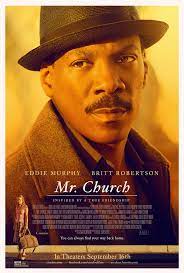
MR CHURCH
US, 2016, 104 minutes, Colour.
Eddie Murphy, Britt Robertson, Natascha McElhone, Xavier Samuel, Lucy Fry, Christian Madsen, McKenna Grace, Natalie Coughlin, Madison Wolfe, Lincoln Melcher.
Directed by Bruce Beresford.
Mr Church was released in 2016 and must have gone under the radar for many filmgoers and even for Eddie Murphy fans. While he made some items for television, he had not made a feature film for four years. And, this is a surprising choice for him.
His Mr Church is his most restrained film role, a gentle and kindly man, ageing over some decades, working as a cook for six months for a single mother (Natascha McElhone) and her young daughter, the mother with terminal cancer. At first, the daughter has tantrums against Mr Church but gradually accepts him, gets to like him.
Mr Church has a private life only gradually revealed in minimum detail, working for the family during the day, leaving for the night. Six years pass and Mr Church is still with the family. The focus is on Charlie, the young daughter, now played by Britt Robertson. Her mother has lived on, promises to live so that Charlie goes to the prom with a friend from school, played by Xavier Samuel. And then her mother dies.
There is a gap from some years while Charlie studies at college in Boston but, suddenly pregnant, she returns to her home town, taken in by Mr Church, but failing him as she is curious and enters his room and is caught by him. However, he relents, the baby is born, grows up, she works in a diner, and Mr Church lives his life.
When he becomes ill, the doctor turns out to be Xavier Samuel – with prospects for a happy ending there. When he dies, Charlie learns that his private life was playing the piano in the club in town.
This is a very nice film, has some edge, but is a story of love and friendship – and directed by Bruce Beresford.
- The plain title? The focus on Mr Church? His story?
- The American town, homes, school, clubs, donors – the ordinary town? The musical score?
- The film based on a true friendship? A story of friendship and consequences?
- Charlie and her voice-over? Her story and Mr Church? Her mother and Mr Church?
- The opening situation, Marie and Charlie, the single mother, no father, the arrival of Mr Church to cook, six months payment? Charlie has an initially spoilt brat reaction, the breakfast, refusing to eat, tantrum, going to school, not wanting Mr Church in the house? But the gradual change, his excellent cooking, the food? Her discussions with Poppy at school? The meeting Mr Church, Poppy and her liking him? The change of situation?
- Marie, love for her daughter, accepting Mr Church, his knowing about her breast cancer, secrecy from Charlie? Marie and her reliance on Mr Church? The six months? The diagnosis, prognosis, six months, the treatment? But her surviving?
- Audience response to Mr Church? A different role for Eddie Murphy, restraint, kind (only the drinking sequences and his once losing his temper), gentle, caring, the quality of his cooking, housekeeping? Yet his private life, secrecy? Charlie’s curiosity?
- Six years passing, the situation in the household, relying on Mr Church? His continuing his routines? His care for Charlie, at school, her friends, cooking?
- Charlie at school, friendship with Poppy, friendship with Lincoln, the question of the Prom? Lincoln and inviting her, her surprise? Reluctance? Her mother’s support, Mr Church? The dress and the patterns, the Prom, Lincoln arriving, teaching him to dance at the prom? Marie and her illness, saying that she would live for the Prom? Her death in Charlie discovering her? Grief?
- Charlie, the decision to go to college? Mr Church, the money he kept from the coupons and savings giving it to Charlie? Her going to Boston, time passing, her studies, friendships, roommates? Her pregnancy – a fling and no explanation?
- The friendship with the young man, his drinking, the car accident and the death, his responsibility, AA? The chance encounter, Charlie being hit by the skateboarder, taken to hospital, and the later revelation that the young men had been contemplating suicide?
- Her return home, her moods, meeting Mr Church, his taking her in? Her curiosity, going to his room, his temper, ousting her?
- Sleeping in the car, nowhere to go? Mr Church relenting? Her living with him, the pregnancy, the birth of her daughter, the delight? Her getting the job in the diner? The chance of her seeing the Jelly Club and Mr Church going there, still curious, his returning drunk, leaving the matches and her taking hiding them? Mr Church growing older, playing the piano, Charlie and the daughter growing up, Mr Church and his devotion?
- Charlie’s friendship with Poppy, at school, Poppy and her reaction against her parents, arriving back in the town, two marriages, wealthy, renewing her friendship, buying gifts for Charlie? Charlie interpreting her reactions as condescending? The break, the gift of reconciliation, Poppy supporting Charlie after Mr Church’s death?
- His returning drinking, Charlie and the kitchen, the matches, Mr Church knowing that she knew where he had gone?
- Mr Church, his illness, reluctance about the doctor, the discovering Lincoln was the doctor, his treatment for Mr Church?
- Charlie, going out with Lincoln? The concern about Mr Church? Her daughter? And the discovery of Mr Church dead? The wake, the grief? The man coming from the Jelly Club, tribute to Mr Church, and the revelation of his playing the piano there for 30 years?
- An emotional film – touching the heartstrings?
I'm Wanita
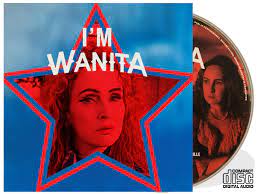
I’M WANITA
Australia, 2021, 88 minutes, Colour.
Directed by Matthew Walker.
That’s Wanita with a W instead of Juanita – Wanita explains that her mother wasn’t literate, hence the W.
Wanita has lived in Tamworth for over 25 years – and prominently above the front door of her house there is proclaimed Honkytonkville. And Wanita has been proclaimed the Queen of Honky Tonk.
Which means that this lively documentary has two potential audiences.
First of all, it is for those who are fans of country music, rhythm and blues, honky-tonk, who know the festivals in Tamworth and beyond, who appreciate the songs, the singing styles, the personalities of the singers, their accompanists, the bands. Which means that there are quite a lot of songs throughout, some some with enormous verve by Wanita, many own compositions, but also versions of, especially, two singers that she admires and talks about, even with reverence, Loretta Lynn and Hank Williams.
Second of all, the potential audience consists of those who are not Tamworth fans and who may have never heard of Wanita.
Which means that this is a documentary portrait for her fans and for those who don’t know her. And, what a portrait – even visually in so many close-ups, flaming red hair, not exactly petite, not exactly her younger self when she won competitions in the 90s. But, here she is, in her 40s, erratic in her behaviour, involved in sex work to make ends meet, still singing – but, with a huge ambition to fulfil a life’s dream, to go to the US, to Memphis, to New Orleans and, especially, to Nashville and record an album there. The latter part of this film, after she received an unexpected financial gift, takes her to America. And, she is accompanied by two firm friends, guitarist Archer (with a pleasing song or two during the film), who still tours Australia, and versatile musician Glennie Ray Virus who serves as her manager – not without frustrations at Wanita’s tantrums, drinking…
So far there has been no mention of Wanita’s married name – and this is quite an unanticipated story in itself! It is Turkish, Bahtiyar. Almost 20 years ago, Wanita went to Turkey for a possible marriage and ended up marrying the father of the intended groom!! His nickname is Baba and, at the time of filming, he has lived with his wife in Tamworth for 17 years, loving her, she seemingly smitten with him, some exchanges in Turkish, and he continually concerned about their lack of money… At the end of the film, it is noted that he died in 2020.
Wanita also has a daughter, resembling her mother in appearance, who appears in the film, appreciating her mother, but sometimes alienated.
So, this is a very colourful documentary, Matthew Walker expanding his 2016 short film, Heart of a Queen. Wanita is a very strong personality, strong and determined singer with a voice appreciated around the world. (But, we might not like to actually encounter her in real life! - rather, when she is on stage performing).
December 8th MSC Foundation Day. The Mission Heritage
December 8th MSC Foundation Day. The Mission Heritage

We are all familiar with the Novena made by Jules Chevalier and Edouard Maugenest to end on the declaration day by Pius IX of the Immaculate Conception of Mary – and the donation that enabled the two to establish the congregation.
As a tribute to this French spiritual and missionary heritage, here is the core of an address to the French Province by Rochus Tatamai MSC (now Archbishop of Rabaul) when he was on the Basilica staff in 2004.
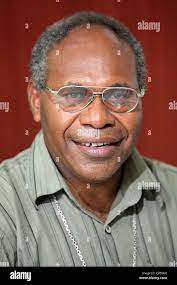
“As Missionaries of the Sacred Heart, you helped us to respect ourselves and to love each other, especially to love our traditional enemies. You gave us the teaching of Jesus Christ, the Good News. You baptized us into the Body of Christ.
As linguists, you learned and you spoke our languages . You wrote our dictionaries and you taught us our own grammar.
As diplomats, you negotiated with civil authorities for us. You taught us about our own human rights and about religious freedom.
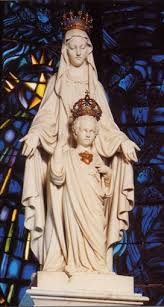
As mediators, you reconciled tribes that were at war. You promoted other cultural values such as the mutual exchange of gifts in order to reach reconciliation. You courageously opposed the traditional law of vengeance (pay back). You won the trust and respect of our people.
As builders, you built our churches, our schools, our clinics, our roads, our bridges and our ports.
As teachers, you taught us to read and write.
As anthropologists, you studied our social structures and you entered into our Melanesian vision of the world. You used our chants and dances to express our faith in the liturgy and in the celebration of the sacraments.
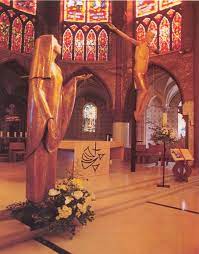
As mystics, you studied our religious beliefs and our initiation rites. You explored our sacred space and time. We recognize you as spiritual men, men of prayer, men of God.
As experts in agriculture, you taught us new ways to cultivate the earth and to produce crops.
As doctors, you healed us with your "miracles" when you gave us your medicine and your knowledge.
And as Missionaries of the Sacred Heart, you gave us a God of love who fills us with hope.
You are the entire religious province of France/Switzerland which has always considered my country a priority in the service of the mission, with all the Fathers and Brothers already deceased, often at a very young age, who gave their lives for us.
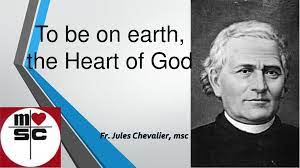
To all of you great THANKS and to the God whom you have represented, glory and praise forever!”
Tina

TINA
US, 2021, 118 minutes, Colour.
Tina Turner.
By Daniel Lindsay, T.J .Martin.
This is a vigorous and dynamic documentary, in keeping with the personality of its star, Tina Turner.
The film is framed by interviews with Tina in Switzerland in 2019, age 75, looking back over her tumultuous life, her career with her husband, Ike Turner, revelations about violence and abuse, her comeback and becoming a superstar of rock ‘n’ roll. There are also quotations from her revelatory interview in 1981 for People Magazine.
The film is satisfying in so far as we are shown Tina Turner and listen to her voice, her memories of the past, telling her story, the ups and downs, the struggles, the final triumph and her exhilaration.
The film goes into various archives, providing a great deal of film footage of the young Tina, of her work with Ike, footage of Ike himself, television interviews, music. And there are photos of her home town of Nutbush Tennessee. Both her father and mother disappeared and she was in the care of relatives. Her mother does reappear at the end of the film, critical of her daughter, seemingly unable to love her, but Tina providing some comfort and luxuries for her mother in her older years.
The film spends considerable time on Tina’s relationship with Ike Turner, his promoting her, their vigorous performances, growing success, Ike’s musical abilities. She joins him in 1957, marries him, four children, two from his previous marriage, one from her previous relationship, one son whom they both parented. There is a great deal of footage, plenty for fans to enjoy of Tina and her performances, the costumes, her reliance on the vigour of her body, movement and dance, distinctive style.
The film also covers the truth about her relationship with Ike Turner, his music success, his management of Tina, the violence of their home life, her attempted suicide with pills, the role of the children, her eventually moving away from him, leading to divorce in 1976, her not benefiting financially from the divorce, her having to work in all kinds of situations, take on television guest appearances…
And, that might have been the end, but then liberated from Ike, and with enormous determination, she moves towards a comeback (although the narrative indicates that with the Ike and Tina performances she had never arrived as Tina herself, and this was her coming).
Roger Davies became her manager at the end of the 1970s, determined that she should have an album, making all kinds of contacts, failing, Tina eventually moving to London. She met Terry Britain – and, at first unwillingly, she created her hit What’s Love Got To Do With It (and with quite some renditions here). She also collaborated with Kurt Loder for an autobiography which was also highly successful. There followed tours all around the world, featuring 186,,000 people at a concert in Rio. There were book signings, television interviews – and her strong regrets that interviewers still kept going back to Ike and her time with him rather than focus on her emergence. It was at this time that she made Mad Max, Beyond Thunderdome in Australia (a minute more of this would have been welcome!)..
Some attention is given, with interviews with star, Angela Bassett, to the film on her life and career, also called What’s Love Got To Do With It.
Tina became a household word own, Turner not really necessary. From the 1980s, she has been a world star, distinctive in her performances, her vigorous voice. There are excerpts from later concerts and with songs such as Simply the Best.
In 2019, Tina Turner attended the premiere of the musical based on her life, staged on Broadway. She also talks about her relationship with her husband from 2013, Erwin Bach, who served as a producer for this film and is also interviewed. She has lived in Switzerland since the 1990s and is a Swiss citizen.
While Tina Turner has had a hard life, she is obviously quite a survivor, and encouragement for show business performers, and beyond.
